What Is Nomophobia? Am I Addicted to My Phone?
The development of mobile technology has significant importance in our lives. With the latest technological developments especially seen in a smartphone, they have become indispensable and extremely productive tools. However, the overuse of technology, the internet, and specifically mobile phones has many negative impacts that can cause phone addiction.

What Is Nomophobia?
Nomophobia or NO MObile PHOne phoBIA is a psychological condition whereby a person has a fear of being detached from their phone. Unlike phone addiction, the term nomophobia has been included in the DSM-IV, and has been labelled as a “phobia for a particular/specific thing”.
Various psychological factors are involved when a person overuses mobile phones (a person with low self-esteem can find an online personality more secure or a person with an extrovert personality can be too expressive thus too interactive on social media, etc.). Day by day, this problem is becoming a global issue.
Nomophobia symptoms can include anxiety, respiratory alterations, trembling, perspiration, agitation, disorientation and tachycardia. It is important to track your children’s habits and check for these symptoms.
Within the above-mentioned symptoms of nomophobia, other mental disorders like social phobia, social anxiety and panic disorder may also precipitate. It is very difficult to differentiate whether the patient becomes nomophobic due to cell phone addiction or existing anxiety disorders manifest as nomophobic symptoms.
Definition of Phone Addiction
Phone addiction is the problematic usage of a mobile phone. It is a behavioral addiction similar to other addictions such as gambling, shopping, gaming and internet addiction. If not prevented, it can lead to severe mental, physical and social distress.

We used to use our phones as communication devices. Now with the integrated GPS, cameras, and constant access to social media, they have become too smart to get rid of. It’s becoming harder to see a person on the street without their phone in their hand.
It can appear in different forms. Some only talk for hours on the phone, while others prefer texting day and night. But the most common addiction appears in the overuse of social media, in other words, social media addiction.
Smartphone addiction is mainly caused by the social media platforms that we constantly use. Especially children and young adults who tend to overuse social media can face such consequences. Again, there are different forms of it as well. Some like the interaction they get from social media. They like being followed and getting likes and retweets. On the other hand, some people like to monitor. They check for updates, new posts, etc. They develop more of a screen addiction.
Children and young adults are more vulnerable to the negative effects of nomophobia and phone addiction. It is important to decrease these effects and improve their mental skills by introducing them to age-appropriate technologies.
MentalUP is a scientific and entertaining educational gaming app with more than 10+ million downloads. It promotes children’s learning abilities and visual intelligence along with many other mental and social skills.
The logic behind the smartphone addiction and any chemical substance addiction is quite similar. When our screen lights up with a new notification, our brain releases dopamine, a neurotransmitter that makes us feel good. It is the same when we eat our favorite flavored ice cream or get a hundred likes on a post. Dopamine reinforces (and motivates) behavior that makes us feel good and in time, it turns into an addiction.
As much as we describe these activities as addictions, there are currently no clinical diagnostic criteria for this disorder. However, the problematic use of cellphones is an unhealthy habit that needs to be handled. Just think about those many times that you had to warn your child to use their phone less. Therefore it is important to recognize the symptoms and get ahead by learning how to break phone addiction.
Here are some cell phone addiction statistics that will help you comprehend the seriousness of the issue.
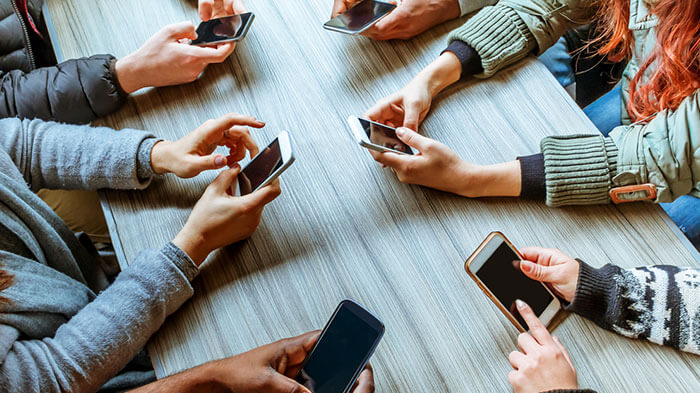
Phone Addiction Statistics
- As of 2020, over 3.5 billion people own smartphones
- In 2019, 194 billion apps were downloaded
- Two-thirds of the world are now connected via mobile devices
- 58% of smartphone users can’t go one hour without checking their phones
- An average user touches their smartphone 2617 times and unlocks it 150 times a day
- 45% of smartphone users check their phones in the middle of the night
- 71% of smartphone users usually sleep with or next to their mobile phone
- Most children own a mobile phone by the age of seven
- Nomophobia is the People’s Word of 2018
These cell phone addiction facts serve as proof that there is an obsessive amount of smartphone usage.
Using technology for the right purposes can be very beneficial. MentalUP offers games that boost memory, attention, focusing, and a lot more to support the development of cognitive skills for both children and adults.
Signs and Effects of Phone Addiction
As with any addiction, smartphone addiction and nomophobia have noticeable signs and side effects. If your child has been spending too much time on his/her phone, you may want to pay close attention to these signs.
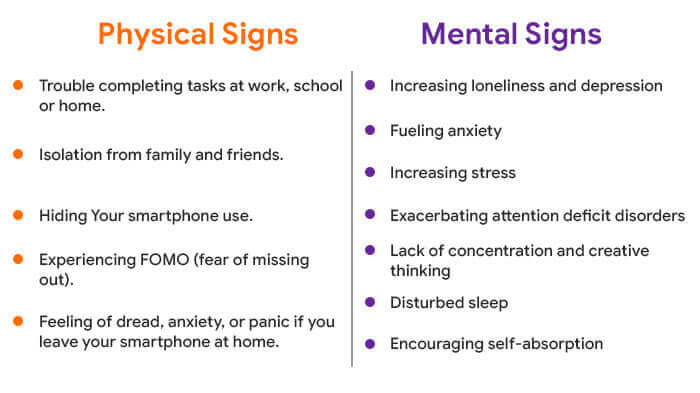
Physical Signs
Here are the physical signs that may appear:
Trouble Completing Tasks at Work, School or Home
A cell phone addiction can take many productive hours from you, which may eventually lead to failing to fulfill your responsibilities. Have you ever missed the due date of a project for work or homework for school when on the other hand you have no pending messages on your social media accounts and your feed is up to date?
Isolation From Family and Friends
You can ask yourself “Am I addicted to my phone?” if you feel more connected to your phone than you are to your friends and family and use your phone even while you are in a face-to-face conversation with them.
Hiding Your Smartphone Use
You might want to find out how to stop being addicted to your phone if you find yourself lying to others and coming up with excuses to be able to go online.
Experiencing FOMO (Fear of Missing Out)
If you compulsively need to check social media, you might have a mobile phone addiction. When was the last time you logged in, 3 minutes ago, maybe 5?
Feeling of Dread, Anxiety, or Panic If You Leave Your Smartphone at Home
Do you feel deprived when you can’t access your phone? If the answer is yes, you may want to seek smartphone addiction help.
Mental Signs
There are various mental signs and effects of this addiction:
Increasing Loneliness and Depression
Although social media platforms exist for people to socialize, users can feel lonely when they can’t get the amount of desired attention on social media. In fact, 1000 followers can mean absolute loneliness when there is zero real-life interaction with them.
Fueling Anxiety
People who have a cell phone addiction experience anxiety and perform poorly on given tasks.
Increasing Stress
Cell phone addiction can also cause extreme stress due to the urge to respond to every text, notification, etc.
Attention Deficit Disorders
The constant stream of information and notifications on your mobile device can be overwhelming. It preoccupies your brain, preventing you from focusing on other tasks. How many times have you been interrupted by a notification during a meeting or while doing your homework?
Lack of Concentration and Creative Thinking
It can also cause distraction which results in a lack of concentration and creativity.
Disturbed Sleep
Cell phone addiction statistics show that 45% of people check their phones in the middle of the night. Disturbed sleep will affect your physical and mental health.
Encouraging Self-Absorption
Posting endless selfies and promoting your life on social media can lead to a split personality, narcissism, and many more personality disorders.
Low grades, lack of concentration and learning disabilities are some of the most important effects of nomophobia and phone addiction. It is crucial to reduce these effects to improve your children’s life quality.
MentalUP is designed with the full support of child development experts and pedagogues. It reinforces children’s mental health in various ways from improving concentration to enhancing verbal intelligence.
Social Effects
Along with the cell phone addiction symptoms that appear, there are social effects that individuals experience. In the U.S., each year nearly 390,000 injuries occur due to texting while driving. 1 out of every 4 car accidents is caused by it.
Not only drivers, but pedestrians that have smartphone addiction or nomophobia also lose attention, which leads to injuries and accidents.
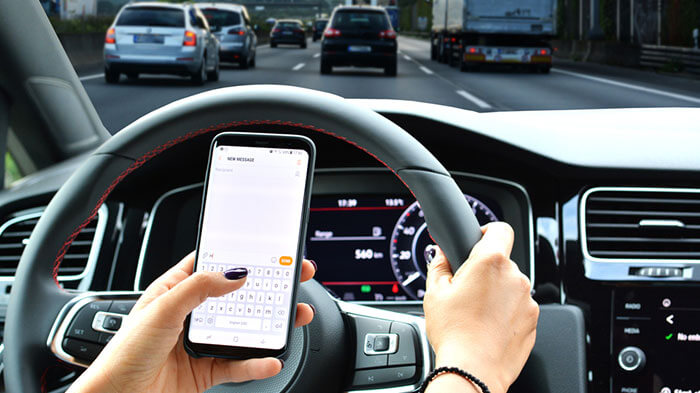
Another cell phone addiction symptom is detachment from reality. People who spend too much time on their phones and develop a smartphone addiction start to live their lives online and, while socializing on those platforms, they start to disconnect from real life.
Teenage Phone Addiction
Teenagers and children are more likely to develop a mobile phone addiction or nomophobia because they are more open and familiar with technology. Teenage cell phone addiction mainly occurs with the overuse of social media.
Apps like Instagram and Twitter can be highly addictive, and if not monitored properly, you may dismiss the signs of your child being addicted to their phone. Teenage cell phone addiction symptoms usually emerge as disconnection from family, lack of interest in school, eating and sleeping disorders, along with the aforementioned signs.

Children’s and teenagers’ minds and bodies are more vulnerable. Today, even children aged 12 use smartphones. A child who displays an uncontrolled use of mobile phones or smartphones is much more likely to develop an addiction. Having an addiction at that age, a child can suffer from severe symptoms.
Kids and teenagers addicted to phones can experience:
- Learning difficulties
- Lack of concentration and focus
- Behavioral problems
- Personality problems
- Eating disorders
- Sleeping disorders
- Socializing problems
Along with other mental and physical problems. As always, one addiction can lead to another. Kids addicted to phones can, later on, pick up a gaming disorder or other addictions as well. Keeping an eye out for teenage cell phone addiction symptoms and interfering when needed has extreme importance to prevent your child from developing nomophobia or phone addiction.
How to Stop Phone Addiction?
Once you have checked the signs and figured you or your child has an addiction, now it's time to learn how not to be addicted to your phone. If you are still not sure, take our cell phone addiction test and get ahead. Here are 10 practical daily tips on how to break phone addiction.
10 Practical Tips to Overcome Phone Addiction
Here are some tips that you can easily apply to your or your children’s daily routine.
Turn off Notifications
Let’s start with an easy step. When you have fewer reminders on your phone, you have less desire to check on it. Turning off notifications is one of the most effective ways to break phone addiction.
Turn on Grayscale
One of the reasons your phone can seem so attractive is the colors and themes that it displays. By turning on grayscale, taking or posting photos and other addictive activities may not look so attractive anymore.
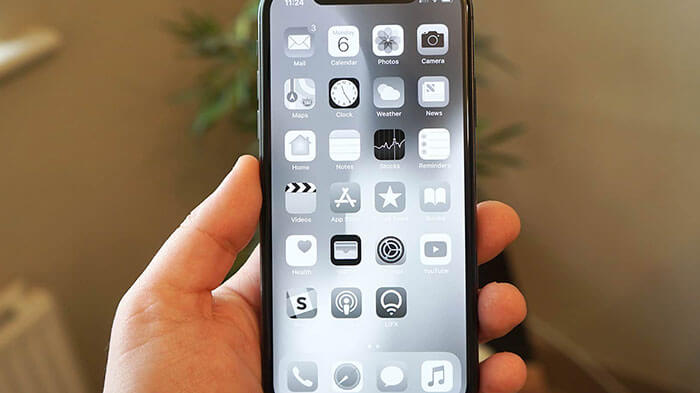
To start your cell phone addiction treatment, follow these steps that apply to your phone:
iOS: “Display Accommodations” - “Color Filters.”
Android: “Vision” - “Grayscale.”
Better Replace Than Quit
It is way easier to replace a habit rather than break one. Most people are driven to their phones out of boredom. To quit your mobile phone addiction, find another hobby.
Declutter
Why are people addicted to their phones? Some people are actually addicted to apps. Start deleting the apps that you can live without. Do you really need 5 photo editing or 3 cooking apps?
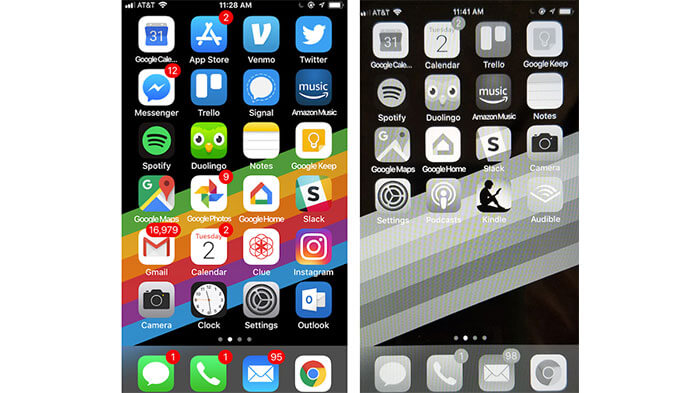
Keep It at Your Bedroom Door
If you sleep with it you wake up with it. Leaving your phone out of reach when you go to bed is one of the best ways on how to avoid cell phone addiction. Plus, it will add quality to your sleep.
Mini Phone-Vacation
Spend time away from your phone. We know when we do and don’t need to reach for it. You can overcome phone addiction by simply breaking your ties.

Keep Track
Keeping track of your screen time is one of the most effective ways on how not to be addicted to your phone. You can use apps that will help you track time and raise self-awareness of your addiction, which is the best way to quit it.
Use a Phone-Band
Brad Soroka recommends placing a hairband around your cell phone. When placed in the middle of the phone, the hairband allows you to answer phone calls easily, but makes it difficult to use it for anything else.
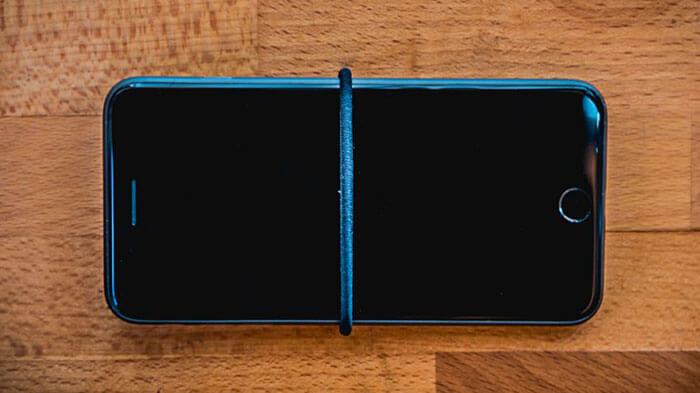
Rely on Your Phone Less
Yes, apps and tools do make our lives easier. But using our phones as agendas, maps, albums and everything else that comes to mind is how we develop phone addiction in the first place. Rely less on your phone, try to use it for verbal communication only.
Diamond Cut Diamond
Yes, we use our phones a lot, but using them to raise self-awareness and for benefits like mental development can be very helpful. Especially if you or your child are looking for ways on how to break cell phone addiction, MentalUP is what you are looking for.
Gamified educational apps such as MentalUP are immensely rewarding and can be navigated more efficiently with the time limitations that you can set for yourself. Especially when it comes to teenagers and kids addicted to phones, MentalUP is one of the best ways to help overcome it.
IMPORTANT: The time-limiting feature of MentalUP prevents phone addiction, and reduces the time spent by children on the screen.
Prepared with the full support of child development experts and pedagogues, MentalUP limits the duration of daily use and offers parental control.
In this way, while children develop their cognitive skills with fun exercises, they are also away from the negative effects of cell phone usage and less likely to develop a phone addiction or nomophobia. In addition to that, parents can follow their child's development on a daily basis.
Phone Addiction Test
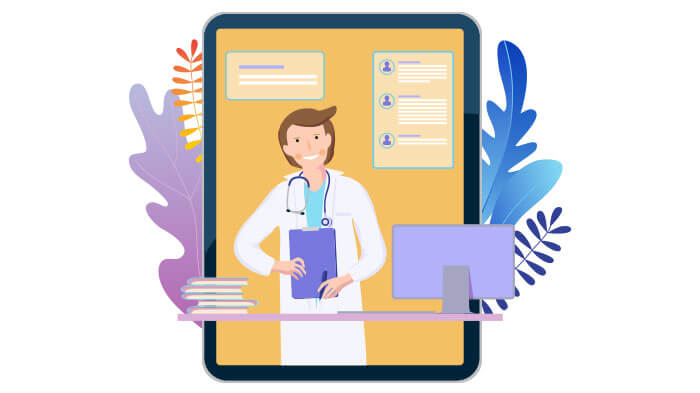
With this cell phone addiction test, which you can apply to your child or to yourself, you will find out how dependent you are. Please read all of the questions carefully and mark the answer that best suits you. Before selecting an answer, consider how often you encounter the mentioned problems.
NOTE: The content of this test has been compiled from users diagnosed with nomophobia. The test is intended only to give an opinion: There is no definitive provision or official validity.
You are great! You have a very, very low risk of phone addiction 👏 If your answers to all questions were sincere, there is no need to worry.
But don’t forget, over time, your or your child’s habits may change. Consider the following recommendations to protect your routine and avoid the risk of developing an addiction: How to Prevent Technology Addiction?
You are in a pretty good state ✔️. Right now, you don’t need to worry about phone addiction. You spend the right amount of time on your devices as it should be.
But don’t forget, over time, your or your child’s habits may change. Consider the following recommendations to protect your routine and avoid the risk of developing an addiction: How to Prevent Technology Addiction?
Your phone usage hours are higher than they should be ⚠️ You're not addicted yet; however, you should pay attention to your habit of using your phone.
Would you like to reduce the risk of developing nomophobia or an addiction? Read the following tips to review your habits and help yourself prevent the risk of it: How to Prevent Technology Addiction?
You're spending a lot of time on your phone and you're at risk of developing an addiction ⚠️ At this stage, using your phone this much can damage your life and your social relationships. You have to act before it's too late.
Would you like to reduce the risk? Read the following tips to review your habits and get out of the pre-addiction phase: How to Prevent Technology Addiction?
⚠️Caution: You have many symptoms of phone addiction!⚠️
You must take immediate action to avoid dependency and addiction, and take precautions.
Would you like to get rid of your addiction? Click here to learn how to free yourself from your undesired phone-related habits with the advice of the experts: How to Prevent Technology Addiction?





